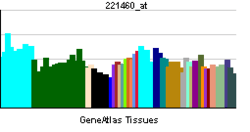OR2C1
| OR2C1 | |||||||||||||||||
|---|---|---|---|---|---|---|---|---|---|---|---|---|---|---|---|---|---|
| Identifiers | |||||||||||||||||
| Aliases | OR2C1, OLFmf3, OR2C2P, olfactory receptor family 2 subfamily C member 1 | ||||||||||||||||
| External IDs | MGI: 106182 HomoloGene: 7459 GeneCards: OR2C1 | ||||||||||||||||
| |||||||||||||||||
| RNA expression pattern | |||||||||||||||||
 | |||||||||||||||||
| More reference expression data | |||||||||||||||||
| Orthologs | |||||||||||||||||
| Species | Human | Mouse | |||||||||||||||
| Entrez | |||||||||||||||||
| Ensembl | |||||||||||||||||
| UniProt | |||||||||||||||||
| RefSeq (mRNA) | |||||||||||||||||
| RefSeq (protein) | |||||||||||||||||
| Location (UCSC) | Chr 16: 3.36 – 3.36 Mb | Chr 16: 3.84 – 3.84 Mb | |||||||||||||||
| PubMed search | [1] | [2] | |||||||||||||||
| Wikidata | |||||||||||||||||
| View/Edit Human | View/Edit Mouse |
Olfactory receptor 2C1 is a protein that in humans is encoded by the OR2C1 gene.[3][4]
Olfactory receptors interact with odorant molecules in the nose, to initiate a neuronal response that triggers the perception of a smell. The olfactory receptor proteins are members of a large family of G-protein-coupled receptors (GPCR) arising from single coding-exon genes. Olfactory receptors share a 7-transmembrane domain structure with many neurotransmitter and hormone receptors and are responsible for the recognition and G protein-mediated transduction of odorant signals. The olfactory receptor gene family is the largest in the genome. The nomenclature assigned to the olfactory receptor genes and proteins for this organism is independent of other organisms.[4]
See also
References
- ↑ "Human PubMed Reference:".
- ↑ "Mouse PubMed Reference:".
- ↑ Centola M, Chen X, Sood R, Deng Z, Aksentijevich I, Blake T, Ricke DO, Chen X, Wood G, Zaks N, Richards N, Krizman D, Mansfield E, Apostolou S, Liu J, Shafran N, Vedula A, Hamon M, Cercek A, Kahan T, Gumucio D, Callen DF, Richards RI, Moyzis RK, Doggett NA, Collins FS, Liu PP, Fischel-Ghodsian N, Kastner DL (Jan 1999). "Construction of an ∼700-kb Transcript Map Around the Familial Mediterranean Fever Locus on Human Chromosome 16p13.3". Genome Res. 8 (11): 1172–91. doi:10.1101/gr.8.11.1172. PMC 310791
 . PMID 9847080.
. PMID 9847080. - 1 2 "Entrez Gene: OR2C1 olfactory receptor, family 2, subfamily C, member 1".
Further reading
- Strausberg RL, Feingold EA, Grouse LH, et al. (2003). "Generation and initial analysis of more than 15,000 full-length human and mouse cDNA sequences". Proc. Natl. Acad. Sci. U.S.A. 99 (26): 16899–903. doi:10.1073/pnas.242603899. PMC 139241
 . PMID 12477932.
. PMID 12477932. - Malnic B, Godfrey PA, Buck LB (2004). "The human olfactory receptor gene family". Proc. Natl. Acad. Sci. U.S.A. 101 (8): 2584–9. doi:10.1073/pnas.0307882100. PMC 356993
 . PMID 14983052.
. PMID 14983052. - Gerhard DS, Wagner L, Feingold EA, et al. (2004). "The Status, Quality, and Expansion of the NIH Full-Length cDNA Project: The Mammalian Gene Collection (MGC)". Genome Res. 14 (10B): 2121–7. doi:10.1101/gr.2596504. PMC 528928
 . PMID 15489334.
. PMID 15489334.
External links
- OR2C1 protein, human at the US National Library of Medicine Medical Subject Headings (MeSH)
This article incorporates text from the United States National Library of Medicine, which is in the public domain.